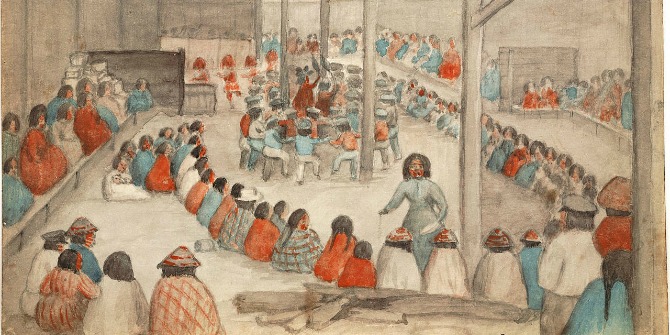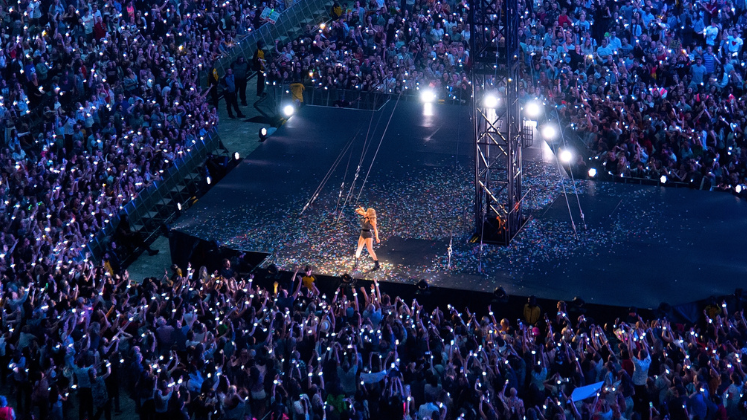 Science communication and comedy may seem like an unlikely match, but Oliver Marsh identifies helpful insights into how the two connect when the boundaries are blurred. Both comedy and science involve presenting a series of logical chains. But science communication comedy relies on a more outdated form of public interaction where one elite person is elevated over the audience. Science comedy then can act as a barometer for science communication more widely – fine for raising awareness, but perhaps not yet suited for maximising nuance, inventiveness, or variety.
Science communication and comedy may seem like an unlikely match, but Oliver Marsh identifies helpful insights into how the two connect when the boundaries are blurred. Both comedy and science involve presenting a series of logical chains. But science communication comedy relies on a more outdated form of public interaction where one elite person is elevated over the audience. Science comedy then can act as a barometer for science communication more widely – fine for raising awareness, but perhaps not yet suited for maximising nuance, inventiveness, or variety.
A couple of years ago I accidentally found myself outside the Royal Society, Britain’s 400-year old elite scientific society. I decided to pop in and say hello. Unfortunately, my ambitions were thwarted by a receptionist asking if I was entering as a Fellow or the guest of a Fellow. I was neither, and ‘I like science’ apparently wasn’t an appropriate substitute. I was barred entry. But, with my eyes flashing and foreboding orchestral music playing in the background, I swore that I would return. And, last Friday, I finally got that opportunity. Unexpectedly this came not from my interest in science, but rather my second major interest – comedy. I was performing as part of ScienceShowoff which, similarly to the Bright Club, provides opportunities for academics to communicate their work via a 9-minute live performance. Where the Bright Club specifies comedy performances but is open to academics from any field, ScienceShowoff specifies a science background but is open to any form of 9-minute live performance. They’re essentially academic open-mic nights, and as such the boundaries between lecture and stand-up comedy are interestingly blurred.

But that’s a bit boring. Let’s explore a little. As I’ve suggested in another interview (self-publicist, moi? I haven’t got time for self-publicity I’m too busy preparing for this), both comedy and science involve presenting a series of logical chains. If your audience don’t follow your premises then they might not ‘get’ your conclusion, whether that be ‘… and due to these conjugated quantities a measurement of electron spin can instantaneously determine the spin of a second electron’, or ‘…or are you just pleased to see me?’. Maximising comprehension is generally a good thing in both science and comedy. But an advantage of comedy is that it can avoid those topics which might defy easy comprehension. As Dara O’Briain points out to critics of his skits on Christianity, “no, I don’t do jokes about Muslims. And that’s because a) I don’t know the first thing about Islam and b) neither do you.” But such an attitude would cause ever-so-slight problems in the field of science communication…

Science communication comedy (sci-comm-com), i.e. using comedy as a tool of science communication, is just a subset of science comedy. You can make jokes about science with no intention of communicating scientific ideas (much of Robin Ince’s material takes this approach). But it’s an interesting subset. The product of comedy and sci-comm squares the above effect – if you want to explain science via the medium of joke, you need to make sure the audience ‘get’ both your scientific and your comedic premises. You can have the funniest science-based joke in the world, but the audience won’t laugh unless they know the science. Conversely, you can have a fantastically clear explanation of some science, but the time spent doing that can slow the comedic pace of the routine. It’s difficult, though not to say impossible, for more esoteric subject matter to produce material with a balanced joke:fact ratio. In fact, writing any joke about esoteric subject matter which doesn’t risk an embarrassing silence is pretty difficult. Which, ladies and gentleman, is the reason we need better science education. Okay there are other reasons, but this is the main one.
But on many views of sci-comm, this isn’t a problem. Even just a few jokes can just make a ‘science lecture’ more fun and engaging, which is helpful both for that particular lesson and for the public image of science/scientists more generally. And those jokes don’t even have to be about science. A common tactic is to intersperse the science with scientifically-themed takes on more obviously humorous topics, like social interactions, everyday foibles, or the end of humanity. Which works nicely in principle, although I do sometimes worry about frequent resorting to old tropes of scientists as geeky and awkward-but-adorable in social situations. Fine, until everyone uses that tactic…. Particularly as Peep Show has used up comedy’s allocated quota of Social Awkward for the next 450 years.
However, for those interested in alternative forms of science-in-public – more Public Engagement than Public Understanding (PES rather than PUS, in hip lingo) – these sci-comm-com trends may be more worrying. The whole image of a stand-up comedy performance reflects the traditional image of sci-comm that PES pushes against – one elite person elevated over an attentive audience, whose role is purely to respond as one mass by laughing, or being awestruck by the science, or whatever. Of course, standup has frequently been used as a powerful tool for anti-elitism and criticism; most obviously by mocking those in power, but also by self-mockery (standup ridicules their own flaws, audience recognises flaws in themselves, audience – hopefully – changes behaviour). Science is certainly used as a tool for mockery, even by slightly higher-profile comedians like Dara O’Briain (1h10 in this is interesting for many reasons. And also very very funny). But self-mockery in science comedy is limited to those cosy tropes of scientists as a bit geeky etc. etc. etc. It was notable, if predictable, that the only performer at the Royal Society show to poke fun at science-as-a-practice was the sociologist-historian Alice Bell. Which is odd as, in the field of sci-comm, scientists and sociologists are usually well on the same wavelength <hint: sarcasm>.
[Just one point to counter that slightly snarky one above: after the show I ended up talking to an actual scientist – Martin Austwick, performer of this lovely song – who proved very amenable to me debunking his misapprehensions of the philosopher of science Thomas Kuhn. Comedy is a medium of harmony. Make Jokes Not War].

I doubt science comedy could fix sci-comm debates. It’s hard enough to write a joke anyway, never mind one that simultaneously provides both scientific education and a reflexive comment on the state of science today. And still get a laugh. The punchline is that science comedy is a kind of barometer of the state of sci-comm. At the moment it’s reminiscent of the political comedy of the 1980s – though instead of shouting about how bad the government is, there’s shouting about how great science is. It’s fine for raising awareness, but not maximising nuance, inventiveness, or variety. But alongside the political comedy of the ‘80s came ‘alternative’ comedy, prompting new approaches to the seemingly self-evident idea of the ‘joke’ and spawning a new generation of experimental and self-critical comics. It made comedy just that bit more interesting for everyone involved – practitioners, critics, and audiences alike. Maybe sci-comm-com just needs a few more hecklers.
Also, is it just me, or – when Brian Cox smiles, does he look like a thin Michael McIntyre?
This originally appeared on Sideways Look At Science and is reposted with permission.
Note: This article gives the views of the author, and not the position of the Impact of Social Science blog, nor of the London School of Economics.
Oliver Marsh will be taking up a PhD at the Science and Technology Studies Department, University College London in September, studying science enthusiasm in social media. Previously he has studied History of Science at the University of Cambridge. His Masters dissertation on Richard Feynman and Carl Sagan as mythological figures will appear as part of ‘The Return of Biography‘ workshop at the Science Museum on 18th July. He also writes for the Science in Society Review and tweets as @SidewaysScience.








In my practice of knowledge mobilization (exchange, public engagement…don’t really care what you call it) we promote arts based research dissemination as a viable means. I haven’t seen comedy used but think it would be great. I have written (but never performed) a knowledge mobilization rap and presented a knowledge mobilization version of the game show, Jeopardy! Engaging audiences through alternative forms of communication can be an effective means of knowledge mobilization.
This is just interesting, we had never heard of this before!!
“Science communication comedy (sci-comm-com), i.e. using comedy as a tool of science communication, is just a subset of science comedy.”
Great post – and very encouraging to see comedy being recognised as a worthwhile and ‘serious’ means of science communication. Of course, its not just laboratory science that lends itself to a comedic approach, public health and social science issues are fairly easy to exploit – with ready made cultural stereotypes to poke fun at – though in keeping with Dara O’Brien’s comment about first hand knowledge, this is ‘least dangerous’ if it’s your own culture you are sending up – such as my Bright-Club take on obesity prevention in Scotland (where it probably helps being Scottish to perform this in Glasgow!):